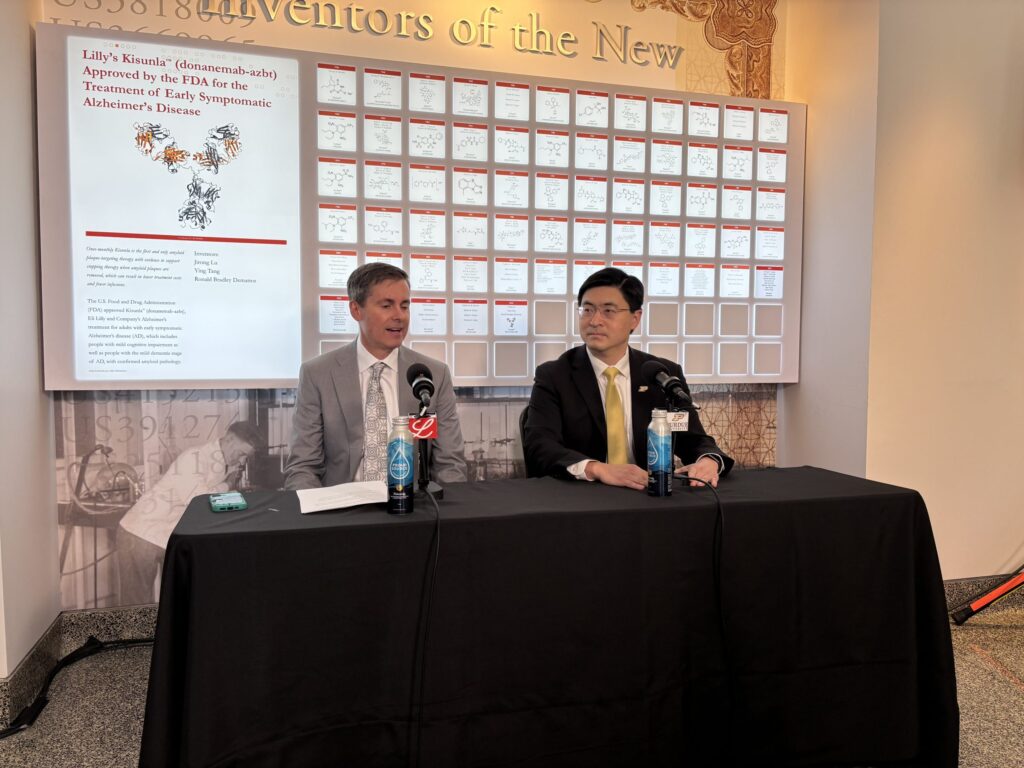Eli Lilly and Co. and Purdue University announced a $250-million expansion of their research partnership on May 9.
Over the next eight years, Lilly and Purdue will collaborate on pharmaceutical research in Indianapolis, West Lafayette and at the Limitless Exploration/Advanced Pace District in Lebanon.
The funding will largely go toward supporting artificial intelligence research projects, including using AI in drug discovery and processing, as well as enhancing drug manufacturing to bring drugs to clinical trials faster and more efficiently. Lilly’s money will also support workforce development to get Purdue students trained and into jobs.
Lilly’s investment with Purdue is significant at a time where President Donald Trump’s administration is slashing federal research spending to universities. Purdue receives nearly 70% of its research funding from the federal government. Purdue President Mung Chiang did not mention Trump in his May 9 remarks.
Chiang emphasized that federal and private funding are both needed to sustain Purdue’s research, and that the university reached a record high in external research funding during the 2024 fiscal year. But with uncertainty about how deep the Trump administration’s cuts will go, Purdue leadership is looking to private companies for funding.
“This may not be the only part of the future of research, but it certainly is an increasingly important part,” Chiang told reporters.
Opportunities for students
The expanded partnership aims to open up opportunities not just for research faculty, but for students. Purdue is guaranteeing internships to all students at its Indianapolis campus, and the expanded partnership could open up more opportunities at Lilly.
Jason Thiagarajan, a sophomore at Purdue studying biological engineering, is part of the Lilly Scholars program, which offers Purdue students interested in pharmaceutical careers free tuition and guaranteed work experience at the company.
Thiagarajan lived in Indianapolis this past semester and interned at Lilly, where he shadowed a process engineer and helped test new manufacturing equipment.
“I’ve been able to gain invaluable technical skills and an amazing network and just really head- start my career,” said Thiagarajan, 20. “I’m only just a sophomore, but I’m so far ahead.”
Students — from undergraduate to post-docs — will also have more opportunities to work as lab and research assistants on pharmaceutical research projects.
“It’s incredibly good for the students to be working on problems that matter,” said Kurt Ristroph, a Purdue professor and researcher. “What problems do you want to solve? Well, the hardest ones that matter the most, if you solve them. We get those many times from these kinds of public-private partnerships, because we can learn from Lilly.”
Purdue and Lilly hope that by increasing opportunities for Purdue students, more graduates will stay in-state after graduation. In 2022, 65% of undergraduates from Indiana’s public institutions remained in the state after earning their degrees — putting Indiana 40th nationally, according to the Indiana Commission for Higher Education.
Purdue and Lilly hope that its collaboration will make students’ degrees more relevant to the jobs of today, opening them up for employment post-grad.
“I think the closer industry and universities can get together on that topic, the better it is for both sides,” said David Ricks, CEO of Eli Lilly, “and most importantly, for the students who can have a successful career and get real value from their degree.”
Mirror Indy, a nonprofit newsroom, is funded through grants and donations from individuals, foundations and organizations.
Claire Rafford covers higher education for Mirror Indy in partnership with Open Campus. Contact Claire by email [email protected], on most social media @clairerafford or on Signal 317-759-0429.
Related
Republish This Story
![]()


